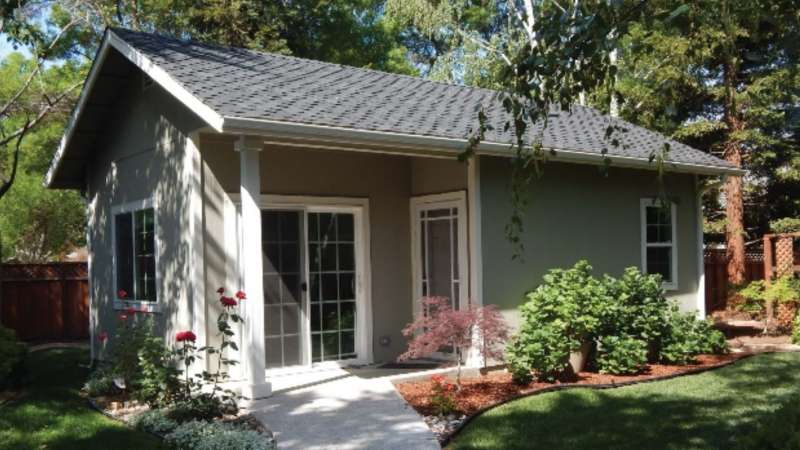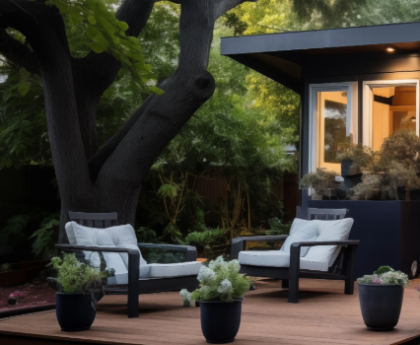
(Updated at 4:20 p.m.) A state-level push to ease restrictions on accessory residential units could put Fairfax County at odds with one of its own senators.
The proposed Senate Bill 304 from state Sen. Saddam Salim (D-37) would require localities to permit accessory dwelling units (ADUs) in residential districts and prohibit them from setting certain conditions, including the provision of dedicated parking for the unit.
Fresh off a primary upset of longtime senator Chap Petersen and a comfortable general election victory over Republican Ken Reid, Salim says he’s “proud” to sponsor the bill in his first term representing the 37th Senate District, which includes Tysons, Vienna, Merrifield, Oakton and the cities of Fairfax and Falls Church.
The legislation was crafted “to help Virginians with the skyrocketing cost of housing,” he told FFXnow in a statement. Filed on Jan. 9, the bill was referred to the Senate’s committee on local government, which met this morning (Monday) but didn’t list this on its docket.
“I have heard from so many Virginians who are being priced out of our communities due to a shortage of diverse and creative housing options,” Salim said. “This bill promotes housing affordability and addresses the growing housing crisis by taking action to increase our housing stock. ADUs provide additional living spaces, accommodating diverse housing needs without the need for extensive new construction.”
Defining an ADU as an independent, secondary unit on a single-family lot with its own living, bathroom and kitchen space, the bill would bar localities from requiring a special permit for the units, which must instead be permitted in residential districts as an accessory use. In Fairfax County, that means they would be generally permitted with only an administrative review.
Localities could impose a permit fee of up to $100 and require a one-ADU-per-lot limit, a rental period of at least 30 days, replacement of the main dwelling’s parking if it’s eliminated by the accessory unit, a maximum square footage of 75% of the main dwelling, and compliance with building codes, stormwater standards and other zoning rules.
However, localities wouldn’t be allowed to require dedicated parking for the ADU, lot sizes or setbacks that exceed the ones for the primary residence, a relationship or “affinity” between the primary and accessory dwelling occupants, owner occupancy of either unit, or “redundant water, sewer, or septic capacity for the ADU.”
The prohibitions on special permits and parking and ownership occupancy requirements clash with the regulations that Fairfax County adopted first in 2021 and, again, in May 2023 as part of its Zoning Ordinance Modernization Project, or zMOD.
With its first comprehensive zoning code update since 1978, the county allowed accessory living units (ALUs) — a renaming of ADUs to avoid confusion with affordable dwelling units — via administrative permit if they’re located in a basement or otherwise fully contained by the main dwelling without any exterior changes.
To be eligible for an administrative permit, rather than a special permit, which comes with its own standards, ALUs must meet size limits, have at most two occupants and two bedrooms, and have at least one parking space in addition to what’s required for the main residence. The county also requires that the property owner live in the primary or accessory dwelling.
Even with those restrictions, the addition of an administrative option expanded the viability of ALUs in the county, which previously limited them to residents 55 and older and people with disabilities. Fairfax County Board of Supervisors Jeff McKay has compared the changes to the end of single-family-only zoning in Arlington and Alexandria in their potential to address the region’s constrained housing supply.
“The zoning ordinance modification is probably the biggest thing we’ve done that could potentially create even more affordable housing in the county than anything else we’ve done,” he told FFXnow in an interview about the Arlington and Alexandria zoning changes.
When asked about Salim’s bill, McKay said the Board of Supervisors “has not taken an official position yet,” but it’s committed to opposing “any bill that diminishes our authority to regulate land use in the County.”
According to the Fairfax County Department of Planning and Development, approximately 14 special permits and 58 administrative permits for ALUs had been approved by mid-December since the zoning changes originally took effect on July 1, 2021. A full report is expected to be released early this year.
The possibility of state lawmakers overriding local ALU regulations by approving SB 304 has alarmed at least one prominent civic organization.
The McLean Citizens Association, a volunteer group that represents the greater McLean area, including Tysons, sent a letter to the county’s General Assembly delegation on Friday (Jan. 19) expressing concern that the bill would “nullify” some zMOD provisions.
“The MCA urges that Senate Bill 304 either be withdrawn (the simplest option), or else amended to achieve conformity with Section 4102.7B Accessory Living Unit of the Fairfax County Zoning Ordinance,” MCA President Linda Walsh wrote. “MCA urges that Senate Bill 304 as it currently exists be opposed by you.”
Acknowledging that land use and zoning are generally governed locally, Salim says he is “in the process of meeting with stakeholders,” including representatives from Fairfax County, and some amendments to the bill will be introduced this week.
“While I support local control over most land use issues, the need for more housing is urgent,” the senator said. “I believe that streamlining the process for building ADUs will help Virginians. Other states, including California, Utah, Washington, and Connecticut, have already implemented widespread permissions for constructing ADUs.”
Photo via City of Alexandria



